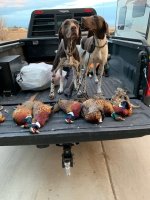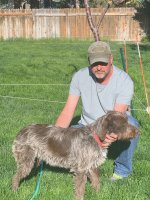You are using an out of date browser. It may not display this or other websites correctly.
You should upgrade or use an alternative browser.
You should upgrade or use an alternative browser.
Which is the best hunt, point and retrieve gundog?
- Thread starter Chestle
- Start date
gim
Well-known member
I can see that a well trained pointer would be an invaluable asset when hunting grouse or quail. I only hunt grouse once a year and 9 times out of 10, the bird flushes with a whirl of wings and I don't even see it, much less get off a reasonable shot at it. A well trained pointer could allow you to get into better shooting position in the woods, which would greatly increase the amount of reasonable shots at flushing grouse. Very few of the pheasants I encounter are tight holding birds. They're runners, especially the roosters. The only time they hold tight where I hunt is in cattails when they're roosted in for the night.There's definitely some fantastic pointing dogs out there.
Munster927
Well-known member
See to me, ruffed grouse are alot more flighty compared to a Pheasant. I've shot many pheasants off a point, I have not yet to shoot a ruffed grouse off of a point in the last 9 years of hunting ruffies. And I have a cabin in ruffed grouse country in Northern MN. Most ruffies I've shot, my dogs birdy, she gets relatively close and they flush or jump into a tree.I can see that a well trained pointer would be an invaluable asset when hunting grouse or quail. I only hunt grouse once a year and 9 times out of 10, the bird flushes with a whirl of wings and I don't even see it, much less get off a reasonable shot at it. A well trained pointer could allow you to get into better shooting position in the woods, which would greatly increase the amount of reasonable shots at flushing grouse. Very few of the pheasants I encounter are tight holding birds. They're runners, especially the roosters. The only time they hold tight where I hunt is in cattails when they're roosted in for the night.
I will say that some pointing dogs can be rangey, so sometimes on pheasants that isn't the best combo especially if they aren't holding tight. My Munsterlanders are pretty close working. Usually 25 to 30 yards in front. So even if they bump a rooster, I'm within reasonable shooting distance.
....oh, it was the owners...all they did was yell, I supposeMy personal experience with pointing breeds has been terrible every time. I've hunted with 4 different breeds of pointers that colleagues owned: German Wire Hair Pointer, Munsterlander, German Shorthair, and a Vizsla. They were all males that weren't nudered. None of them listened very well and 3 of them damn near ruined the hunt because their owners didn't have them under control. None of them retrieved and they all had hard mouths. They would run up to a dead bird and chew it into hamburger. None of those guys got invited back to hunt with me again with their dog present.
I am positive that there are some fantastic pointing dogs out there. I've just never seen one in person. I also think that my personal experience could have been a result of their owners not training them properly too.
Chestle
Well-known member
Here's some newer cross breeds (mongrels?) I had not heard about:
Pointer X Setter = Poinsetter, a traditional Christmas pet
Kerry Blue Terrier X Skye Terrier = Blue Skye, a dog for visionaries
Great Pyrenees X Dachshund = Pyradachs, a puzzling breed
Pekingnese X Lhasa Apso = Peekasso, an abstract dog
Irish Water Spaniel X English Springer Spaniel = Irish Springer, a dog fresh and clean as a whistle
Labrador Retriever X Curly Coated Retriever = Lab Coat Retriever, the choice of research scientists
Newfoundland X Basset Hound = Newfound Asset Hound, a dog for financial advisors
Terrier X Bulldog = Terribull, a dog that makes awful mistakes
Bloodhound X Labrador = Blabador, a dog that barks incessantly
Malamute X Pointer = Moot Point, owned by....oh, well, it doesn't matter anyway
Collie X Malamute = Commute, a dog that travels to work
Deerhound X Terrier = Derriere, a dog that's true to the end
Cocker Spaniel x Rottweiller = Cockrot, the perfect puppy for that philandering ex-husband
Bull Terrier x sh1tzu = Bullsh1tz, a gregarious but unreliable breed
Stolen from another board...anyway, I thought this was kinda funny.
Pointer X Setter = Poinsetter, a traditional Christmas pet
Kerry Blue Terrier X Skye Terrier = Blue Skye, a dog for visionaries
Great Pyrenees X Dachshund = Pyradachs, a puzzling breed
Pekingnese X Lhasa Apso = Peekasso, an abstract dog
Irish Water Spaniel X English Springer Spaniel = Irish Springer, a dog fresh and clean as a whistle
Labrador Retriever X Curly Coated Retriever = Lab Coat Retriever, the choice of research scientists
Newfoundland X Basset Hound = Newfound Asset Hound, a dog for financial advisors
Terrier X Bulldog = Terribull, a dog that makes awful mistakes
Bloodhound X Labrador = Blabador, a dog that barks incessantly
Malamute X Pointer = Moot Point, owned by....oh, well, it doesn't matter anyway
Collie X Malamute = Commute, a dog that travels to work
Deerhound X Terrier = Derriere, a dog that's true to the end
Cocker Spaniel x Rottweiller = Cockrot, the perfect puppy for that philandering ex-husband
Bull Terrier x sh1tzu = Bullsh1tz, a gregarious but unreliable breed
Stolen from another board...anyway, I thought this was kinda funny.
TexasGSP83
Member
I didn’t read all the replies but that sounds like a pointer of some kind. My GSP jäger retrieves dove, points quail, flushes them on command and brings it back. He hunts teal and trails wounded game. I love my GSP. English pointer has a good reputation in the field too.
Drew
Well-known member
I have hunted behind several different gun dog breeds. They all have something to offer and honestly, if you do your part in the training process they all have been serviceable. My dad hunted a German Shorthair (great pointing dog but not completely reliable for water retrieves), followed by a Draathaur (very impressive for upland and waterfowl, however liked to fight every cat, skunk and porcupine that it ever met), followed by a lab which had hard time on upland game but was honestly the best retriever that I ever saw). As an adult, I have owned two labs and have loved them both but I have slowed down and wanted a dog that wouldn't out pace me on pheasants. So, I now have a Pointing Griffon. It can be a little timid when it's not hunting but when its in the field it is a fierce hunter. It never stops hunting and you always need to keep you eyes on it. I've hunted pheasants, chukar and quail behind her and she is a great dog on all three. If she has any downfall at all its that she can be a little timid and CAN get her feelings hurt which is a weird thing for a historic lab owner. Most importantly for me is that she NEVER quits hunting.....ever and always at my pace.Which is the best....whatever is always good for a spirited discussion.
This is a view from across the pond of what I believe we Yanks would call Versatile breeds. I found it interesting because it features some hunting dogs I had never even heard of with pics included.
Which is the best hunt, point and retrieve gundog?
Attachments
Coming from an animal science background, and reproduction a favorite area, I would like to ask this question.
It‘s well known that a cross between two purebreds (F1) will result in offspring with greater performance than what would be expected from the mating of similar purebreds. Heterosis it’s called. It’s the foundation of the hybrid corn industry.
Now in the dog industry I don’t imagine rate of gain, dressing percentage and all the rest is of much importance. Has anyone ever studied the effect of heterosis on traits we do look for in dogs ? How could it be measured ? I really have no idea. The more distant the parents, the better the performance of the offspring, to a degree. Linebreeding still has a place, to cement the desirable traits in a purebred animal.
I do know the best dog I’ve had was a half lab. I haven’t had that many dogs however. The two I had the most trouble with were purebreds.
It‘s well known that a cross between two purebreds (F1) will result in offspring with greater performance than what would be expected from the mating of similar purebreds. Heterosis it’s called. It’s the foundation of the hybrid corn industry.
Now in the dog industry I don’t imagine rate of gain, dressing percentage and all the rest is of much importance. Has anyone ever studied the effect of heterosis on traits we do look for in dogs ? How could it be measured ? I really have no idea. The more distant the parents, the better the performance of the offspring, to a degree. Linebreeding still has a place, to cement the desirable traits in a purebred animal.
I do know the best dog I’ve had was a half lab. I haven’t had that many dogs however. The two I had the most trouble with were purebreds.


